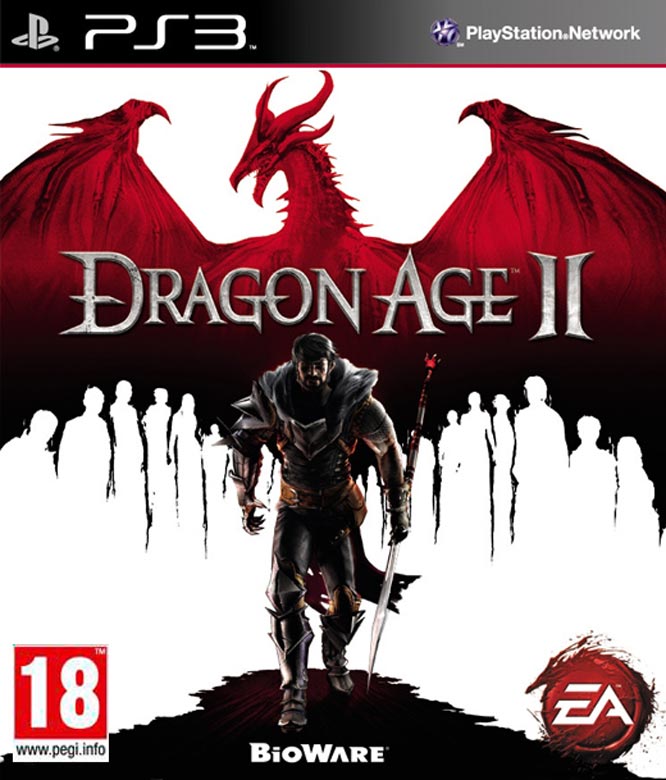 |
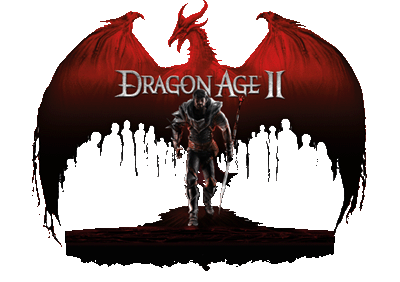 |
 |
3-8-2011 |
 |
- |
  PC PC |
 |
3-11-2011 |
 |
- |
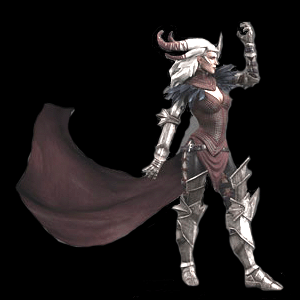 Hawke, his sibling and mother are fleeing the nation of Ferelden and the Blight that has come there. (Dragon Age: Origins) with the aid of one Flemeth, they escaped and traveled traveled across the Waking Sea to the Free Marches and the city of Kirkwall as refugees. Within the span of a decade, Hawke will rise in power and influence to become the legendary "Champion of Kirkwall". He will also become the epicenter of events that change the course of Thedas forever. Listen as Varric relates the Champion's "true story" to Cassandra Pentaghast, a Seeker of Thedas' religious Chantry. Will she uncover the information she seeks? Is Varric's story even true? Nothing is certain in the chain of events that lead to this moment in history. Hawke, his sibling and mother are fleeing the nation of Ferelden and the Blight that has come there. (Dragon Age: Origins) with the aid of one Flemeth, they escaped and traveled traveled across the Waking Sea to the Free Marches and the city of Kirkwall as refugees. Within the span of a decade, Hawke will rise in power and influence to become the legendary "Champion of Kirkwall". He will also become the epicenter of events that change the course of Thedas forever. Listen as Varric relates the Champion's "true story" to Cassandra Pentaghast, a Seeker of Thedas' religious Chantry. Will she uncover the information she seeks? Is Varric's story even true? Nothing is certain in the chain of events that lead to this moment in history.
Dragon Age II, takes off right after, or rather during the beginning of Dragon Age Origins. It was widely regarded as a topper to the original, and a disappointment at the same time. Not something that is too common in the video game world, but lets go through everything, and you will see why both can apply to this otherwise fantastic sequel to my webmaster's RPG pick of 2010.
The plot of DA II is told through a framed narrative, similar to movies like Many Adventures of Winnie the Pooh, and The Princess Bride. It's known that your character, Hawke (a male or female human mage, rogue, or warrior) will eventually become the Champion of Kirkwall. This is known cause the intro to the game takes place some time after the ending of the game. The game play is actually the flashbacks of the narrative. It's also clear that the world is on the brink of a out and out war, and the Chantry (the religion faction in Thedas) has almost completely fallen apart. This is what is known from the outset. What is unknown to the player is exactly how much of this Hawke has a hand in, if any at all. Also it is not known why the Chantry seeks out Hawke with such a driving force. It turns out that Hawke plays the starring role in this drama, and you'll find out exactly how much as the story goes on. Love the whole aspect of this story telling. It is not for everyone, but it certainly leaves you wanting to find out everything. You journey through the game just to get the next bit of information as to what happened.
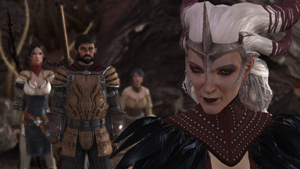 As far as RPG's go, you almost always have the "Villain" that only the hero of the game can defeat. For Final fantasy VI it was Kefka, and for Castelvania it is Dracula. But Dragon Age II took a slightly different approach that might have kind of made it suffer a bit. Rather than a main villain, they chose to use the political struggles of Kirkwall as the points of villainy. This certainly was a giant leap that I think is actually a fantastic idea. But when you have the limited amounts of places to go, and the repetitive caves etc...kind of leaves it on a low. I can say the differences in Kirkwall from the Hightown to Dusktown are fantastic, but it seems like there was so much more that could have been added in and around the city for exploration. Makes it more of a tight spot, rather than a freedom of adventure. You know like that Final Fantasy XIII title. As far as RPG's go, you almost always have the "Villain" that only the hero of the game can defeat. For Final fantasy VI it was Kefka, and for Castelvania it is Dracula. But Dragon Age II took a slightly different approach that might have kind of made it suffer a bit. Rather than a main villain, they chose to use the political struggles of Kirkwall as the points of villainy. This certainly was a giant leap that I think is actually a fantastic idea. But when you have the limited amounts of places to go, and the repetitive caves etc...kind of leaves it on a low. I can say the differences in Kirkwall from the Hightown to Dusktown are fantastic, but it seems like there was so much more that could have been added in and around the city for exploration. Makes it more of a tight spot, rather than a freedom of adventure. You know like that Final Fantasy XIII title.
One of the better, small, additions is the voicing of the main character...Finally! And the Dialogue box has been completely redone to make it a lot easier to have conversations and make choices. As you go through a conversation, a series of little icons will appear to represent the mood the answer will set. Definitely better than guessing that was done in the original. Made for a lot more fun with talking to people in and around the city.
One of the best things about Dragon Age Origins is party banther between your comrades. It could not have been more true in II. The banther between your party is everywhere from completely hilarious to very heartwarming or sad. It adds a great deal of realism and personality to the characters. Also your team is not just to help you fight of the evil around you. They can also partake in conversations, opening up new dialogue options. Anders might be able to tell if someone is possessed by peeking into the Fade, Varric can sweet-talk you out of sticky situations, and Aveline can threaten like nobody's business when the terms are right. These little things your characters do can even open up otherwise unobtainable quests and story lines. Truly a remarkable topper over the original.
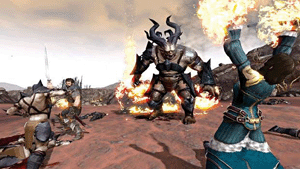 The main appeal of the combat system in Dragon Age II is its versatility. You can easily play it like an action title and mash buttons on lower difficulty levels. (wuss) However if you prefer to strategize what you're doing, raise that difficulty, pause the game, and issue commands for each of the party members. There is nothing more satisfying than creating a great strategy and watching the enemies blood pour and you become victorious! The main appeal of the combat system in Dragon Age II is its versatility. You can easily play it like an action title and mash buttons on lower difficulty levels. (wuss) However if you prefer to strategize what you're doing, raise that difficulty, pause the game, and issue commands for each of the party members. There is nothing more satisfying than creating a great strategy and watching the enemies blood pour and you become victorious!
At first glance it's easy to see that Dragon Age II is, for the most part, a fantastic next step in the franchise. The trade-off is that the areas such as caves and interiors are re-used a lot. As I mentioned earlier, you're in the same city and surrounding areas for the entire game and it can get tiresome to see the same sights over and over and over. Dungeons often look identical and even the mini-map doesn't change. the only difference in most of the caves is which paths are closed off. It's a major bummer that every time you try to explore, the places you discover feel really familiar.
Overall, Dragon Age II is a fantastic piece of gaming masterpiece that takes after its original. Certainly a entertaining game that is fast paced and fun to play. If you loved Dragon Age Origins, you cannot miss this game!
|





